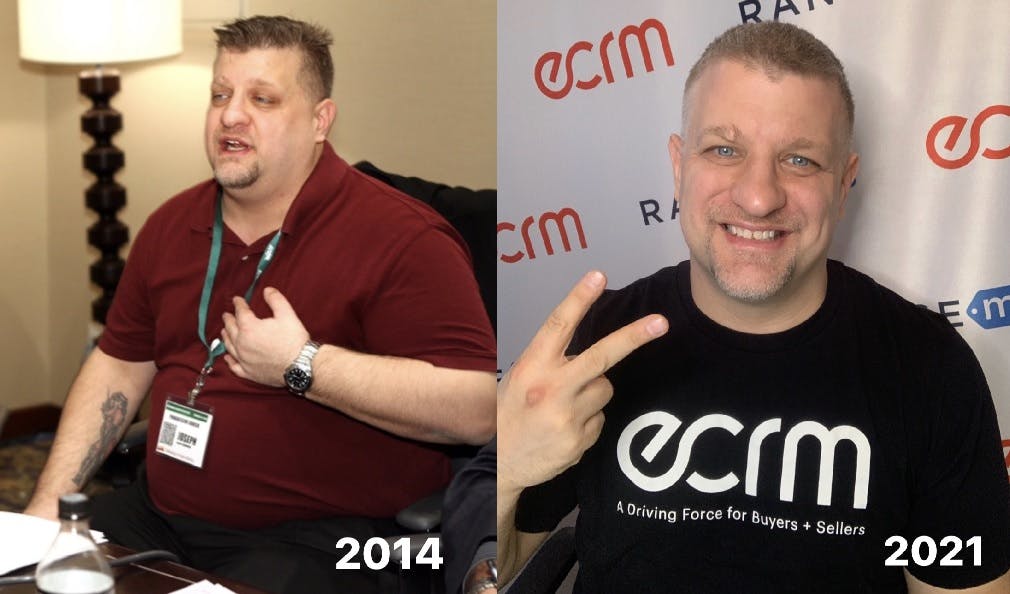The photo below is of me back in 2014. I weighed more than 260 pounds, had no energy, lots of joint pain, and was most likely prediabetic as my diet consisted of lots of high carb, processed foods of little nutritional value. Basically, I ate anything that came in a package and contained sugar, and as you can tell from the dark circles around my eyes, I didn’t get a healthy amount of sleep.

Fast forward to 2021. I’m down to 195 pounds, eat primarily organic foods, grass-fed beef, work out regularly, get consistent quality sleep, and am now full of energy every single day. Good nutrition and supplementation have played a key role in my health journey, including daily nicotinamide tablets with resveratrol, and supplements that include desiccated beef organs, krill oil, MCT oil, and a daily greens powder.
And I’m not alone. Many friends in my age group (I’m 49) have also focused more on their health over the past few years, not only as a means of longevity but also to enhance their performance at work, have more energy, and to bolster their immune systems.
So it will come as no surprise that I had a personal interest in speaking with more than a dozen buyers during ECRM’s Healthy Living, Vitamin & Nutrition Program to see what’s trending among consumers in these categories. The buyers represented organizations that ranged from big-box retailers to specialty ecommerce shops and everything in between. The following are some key takeaways from our discussions:
COVID’s halo effect on wellness
While consumers have increasingly focused on wellness for the past several years, the pandemic has accelerated this trend. We’ve all witnessed how people with comorbidities were at greater risk from the virus, and learned that strengthening our ability to defend against COVID and other diseases requires a more holistic view of health. As a result, many of us have redoubled our healthy living efforts over the past 12 months.
Of course, immunity was king this past year, but we’ve also learned how many other aspects of wellness contribute to our ability to prevent illnesses from occurring and recover from them more quickly if they do. We know that maintaining a healthy gut microbiome, getting consistently good sleep, and reducing our stress levels all contribute to our overall level of wellness, and this is reflected on the product choices consumers are making.
Immunity year-round
Consumers cannot get enough Vitamin C, Vitamin D, zinc, and elderberry, and the pandemic has made these products year-round bestsellers, whether in powder, liquid, or pill form. “Immunity supplement sales are through the roof,” April Coudriet, Sr. Category Manager, Consumer Products, AmerisourceBergen, one of the buyer participants in the Healthy Living Program. “Vitamin D is the biggest seller, with Vitamin C and elderberry close behind.”

However, a strong immune system is built on much more than vitamins and minerals, and over the past year we’ve also learned the importance of gut health, adequate sleep, and stress-reduction in strengthening our immune system. In addition to the traditional immunity supplements, products such as probiotics, melatonin, and stress-reducing herbs like Ashwagandha have also become a mainstay of our COVID war chests.
“Americans are very stressed – 56% of consumers we surveyed said they were often anxious and stressed out, and 33% of them rated their stress levels at a four or five out of five,” says Kate Stevenson, Director of Client Strategy for Brightfield Group, who hosted an on-demand presentation on wellness trends for program participants. “The reasons for this stress include a variety of issues related to the pandemic, many of which are not going away anytime soon.”
Performance optimization for working/learning from home
Working and learning at home means a battle against distraction for many people, especially those with kids stuck at home with them as they go from one virtual meeting to the next. This has led to increased interest in products that help boost focus and aid cognitive performance.
By the same token, eye care supplements help alleviate the effects of staring at various screens throughout the day. Needless to say, any products that can provide a boost of energy are also in demand.
Losing the COVID-19 pounds
With beach weather approaching, plenty of people are looking to drop some of their quarantine weight before heading to the beach, and because of this, weight management products have been gaining momentum the early months of this year, particularly products related to keto diets.
Gummies and other “non-pill” formats are still popular
Gummies still remain the most popular delivery format for many nutritional supplements – something that is immediately evident from the amount of space they are getting on store shelves. But other forms of delivery are trending up, such as sprays, shots, and strips. While I have no issue with swallowing six desiccated beef organ supplements in one go, apparently many other consumers do. “It’s gummies across the board for our customers, especially those gummies without sugar,” says Gina Paige, Buyer with online retailer Biovea. “Flavor is very important with these products, it’s what drives return customers, and many of the brands have certainly raised the bar when it comes to their flavor profiles.”
Less on-the-go means larger pack sizes
As fewer consumers are traveling to and from work, they have switched from smaller pack sizes to sizes that are better suited for consumption at home. “With on-the-go not happening, shoppers are looking for larger sized products and multipacks instead of single-serve nutrition bars,” says Halle DiLuca, Associate Buyer–Drug, for Meijer. “They are shopping less frequently, but they are buying more with each trip.”

They are also buying more online, which should come as no surprise after seeing the surge in online shopping throughout 2020. As we’ve seen in our posts on trends in other categories, such as consumer tech and toy, ecommerce not only offers convenience for shoppers looking to make fewer trips to stores, but also enables retailers to offer a much wider variety of products than can fit on the shelves. What’s more, consumers are also increasingly turning to digital sources for information on health and wellness.
Less demand for cough and cold products
Like many consumers, I stocked up on cough and cold products at the start of the pandemic. But with the quarantining, social distancing, and mask-wearing, we really haven’t had the need for these products, and so they are still in our medicine cabinets, untouched (I myself have three bottles of cold and flu medicine, a box of cough tablets, and a bottle of 200 ibuprofen tables still unopened since April of last year).
Tying it all together with content
It’s clear that wellness has taken on a new meeting among today’s consumers. We’re not just seeking to live longer, but also to live better, and eager to find products that will enable us to do so. We also want information. I, myself over the past year have read more than a dozen books on such topics, including Why We Get Sick, The Longevity Paradox, Lifespan, The Plant Paradox, The Carnivore Code, Why We Sleep, The Secret Life of Fat, and The Circadian Code, just to name a few. I’m a regular listener of podcasts such as The Drive, High-Intensity Health, and Bulletproof Radio.
Each of these sources of content has had an impact on the food, vitamins and supplements I consume, as well as my daily routines around health. So, in addition to providing the products for healthier living, brands and retailers would do well to provide content and resources consumers need to make better decisions on how to incorporate them into their lifestyles.
Consumers are interested in wellness now more than ever before. By helping them to best navigate their health journeys, you’ll become the go-to resource for all of their wellness needs.
ECRM’s Vitamin, Weight Management & Sports Nutrition Program is September 13-17, 2021. Register here.

